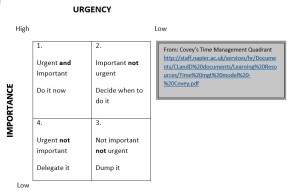
I concluded my last post with a promise of some practical applications for use in Time and Personal Management. I also discussed Steven Covey’s concept that personal management is actually the fourth generation of time management. Covey, in The Seven Habits of Highly Effective People (Simon and Shuster, 1989), describes the first generation as one of notes and checklists. The second generation is characterized by calendars and appointment books; the third generation adds to the preceding two with the ideas of prioritizing, clarifying values and “comparing the relative worth of activities based on their relationship to those values” (Covey). The third generation introduced the setting of both long- and short-term goals, and daily planning to accomplish them. In Covey’s mind this made everything very clinical and distant and often didn’t allow for creativity, spontaneity or relationship building. This led to his fourth generation, which he diagrammed in the following:

Covey’s view is that quadrant two is the optimum place to “be”. I will let you spend time researching this yourselves as I’m sure most of you have a copy of this book in your libraries or if not, know someone who does. It is definitely worth rereading if it’s been some time since you read it.
Some Practical Tips:
As promised, here some practical time management tips that work for me. Only you can determine whether they will work for you, so try them out! If you have your own solutions, tips or tricks, please add them to this discussion.
The Art of Scheduling
- Figure out your goals for the year, month and week.
- Prioritize them.
- Set milestones for each item (what needs to be done, and by when).
- Build in celebrations (treats for hitting targets).
- Put these events into your calendar.
- Block into your calendar events that occur regularly or frequently, both professional and personal. For example:
- I have specific things I want to accomplish each week. One is writing this weekly post, so I block “creative time” into my calendar so that I have dedicated time for writing or producing other material.
- Don’t forget personal time – block in time for the gym, vacations, family time, etc. (In fact why not put these in first and then build everything else around them?)
- At the beginning of each day make a list of items you want/need to accomplish.
- Just write them down as you think of them
- Prioritize them, write 1, 2, 3…. beside each.
- Cross them off the list as you complete them
- If you don’t get to these items just move them to your next day’s list.
- Here is an idea I came across many years ago: If you complete a task that was not on your list, add it anyway and then cross it off. I’ll explain why below.
A major key to getting things done, is to manage distractions. Distractions happen—we can minimize them and manage them, but never eliminate them altogether. Creating a plan for managing distractions is an important time management skill. The first step is to determine what your major distractions are. Doing so can help you find solutions and manage them.
Some common distractions are:
- Colleagues stopping by to chat
- Checking email or voicemail
- Noise in the environment
- Clutter in your workspace
- Boredom after spending too long on one task
- New ideas popping into your head that just “need” to be dealt with now
You can solve these by:
- Establishing “open door” hours
- Closing your door or otherwise indicating “Please Do Not Disturb”
- Using noise canceling headphones
- Setting a regular time to check voicemail and email
- Letting calls go to voicemail
- De-cluttering your workspace
- Building in breaks
Finally, have you ever had one of those days when you feel like you accomplished nothing at all? Let’s go back to my list-making suggestions above. If you cross off the actions you completed plus add to the list other activities you completed that weren’t on the original list, then at the end of the day you can look back at it and, sure enough you will have a documented record of your accomplishments for the day. I guess I can check off “write my next blog post” now.
John Whitehead, MA, CEC, coaches individuals and organizations in becoming more effective by helping them improve their interpersonal communications, emotional intelligence and resiliency.
If you would like to get notifications for when I post, please go to my blog site and register. I promise I will not spam or use your email address for anything else. You can visit and register for my blog at https://johnkwhitehead.ca/blog-2/
*******Are you wondering if having a Leadership/Personal Development Coach is right for you? Contact John for a complimentary, exploratory coaching session********
